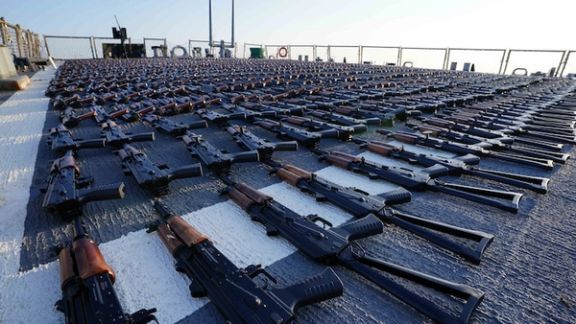Doubts Arise Over US Policy As Iran-Backed Houthis Disrupt Shipping

The White House faced mounting questions on Friday as Iran-backed Houthis successfully disrupted global shipping despite the presence of US naval forces in the Red Sea.

The White House faced mounting questions on Friday as Iran-backed Houthis successfully disrupted global shipping despite the presence of US naval forces in the Red Sea.
Two major shipping and logistics giants, Moller-Maersk and Hapag-Lloyd, announced the suspension of all journeys through the Red Sea in the wake of Houthi attacks on their vessels.
For weeks, the Yemeni Houthi rebels have been targeting and harassing ships with minimal response from the US, underscoring concerns about the Biden administration's apparent reluctance or inability to assert its authority in the face of Iran and its proxies.
"I am absolutely stunned that we're still sitting there in a defensive mode," said former Vice Chief of Staff of the US Army Gen. Jack Keane in an interview with Fox News on Friday. "To shut these people down, you have to take away their capability to do it... You go after the rockets… You go after their entire command and control system… you go after the Iranians because they're really calling the shots here."
Many in Washington are perplexed by what they perceive as the Biden administration's inadequate response to the aggressive actions of Iran and its allies in the region.
While Iranian officials acknowledge their support for the Houthi rebels in Yemen, they emphasize that the group makes independent decisions and acts autonomously. However, it is widely believed that Iran plays a substantial role in their operations.
"While the Houthis are pulling the trigger, they're being handed the gun by Iran," White House National Security Advisor Jake Sullivan stated on Friday. "And Iran has a responsibility to take steps themselves to cease these attacks." However, Houthis began their attack on shipping after Iran's Ali Khamenei last month called for blockading Israel.
The Houthi rebels first declared their intention to halt all transit through the Red Sea to Israel while the Israeli military campaign in Gaza continues. But on December 10, the threat was extended to all shipping. They have been targeting commercial vessels for several weeks, with Friday's attack marking a significant success.
Moller-Maersk and Hapag-Lloyd are global industry leaders, and their decision to avoid the Red Sea could have tangible repercussions on the regional and global economy, particularly if other companies follow suit, further increasing shipping costs.
Approximately 80 percent of global trade is conducted via sea routes, with the Bab-el Mandeb Straits serving as a crucial gateway to the Mediterranean Sea and the Indian Ocean. It plays a pivotal role in maritime access to Egypt's Suez Canal.
Currently, around 12% of global trade transits through the Red Sea, as reported by the International Chamber of Shipping, which has called on nations with influence in the region to intervene and prevent Houthi attacks on ships and sailors.
Last week, US National Security Advisor Jake Sullivan revealed that the Biden administration had reached out to allies to assemble a task force aimed at ensuring the safe passage of ships in the Red Sea.
On Thursday, Iran's Defense Minister, Mohammad-Reza Ashtiani, issued a warning to the US and its allies, suggesting that such a force would encounter "extraordinary problems." Regarding the Red Sea crisis, he asserted, "Nobody can make a move in a region where we have predominance."
Critics of President Biden's Iran policy argue that it has contributed to the current situation by lack of resolve to confront Iran, jeopardizing American interests and emboldening the Iranian regime and its proxies.
"There would be no Houthis without Iran, there would not be Hamas without Iran, there would not be Hezbollah without Iran," asserted US Presidential candidate Nikki Haley in an interview with Fox News on Friday. "If we really want to do something, why doesn't Joe Biden reimpose the sanctions on Iran that were already in place? Deliver a significant blow, and they will back down."